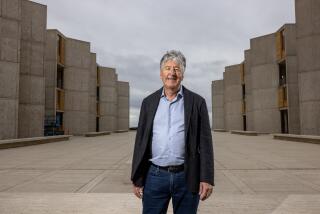Brain Studies at UCI Bring Global Prize to Researcher
At 60, UC Irvine researcher Ricardo Miledi has won the biggest award of his career. Considered one of the world’s leading neurobiologists and the creator of UCI’s Laboratory of Cellular and Molecular Neurobiology, Miledi has been named co-winner of the King Faisal International Prize for science and medicine.
Miledi will receive half the $100,000 prize and a gold medal in March 22 ceremonies to be led by King Fahd Ibn Abdul Aziz in Riyadh, Saudi Arabia. Miledi will share the award with Pierre Cambon, a biochemist at Louis Pasteur University in Strasbourg, France, said a spokeswoman for the King Faisal Foundation, which awards the prize annually to nine winners in five categories. The selection was made by a panel of peers, she said.
Miledi is an expert on the physiology of synapses--the point of contact where messages in the brain are transmitted from one neuron to another--and the transmission of impulses to muscles. Foundation officials said the “frontier territories of neurobiology are now being explored” at the UCI lab.
“Dr. Miledi’s research has been essential in revealing how the brain processes information and how drugs and toxic substances affect the nervous system,” according to foundation officials. His research also has made possible the development of treatments for nervous disorders such as myasthenia gravis, they said.
Miledi, who has published more than 300 scientific papers in his 35 years of research, came to UCI in 1984 as a Distinguished Professor in the department of psychobiology to establish and serve as director of the research laboratory. Previously, he was a researcher in biophysics at University College in London.
It was a long way from his native Mexico City.
‘Started on Something Simpler’
One of seven children, Miledi said his father owned a small business manufacturing blue jeans. His parents did not have the money to send him to a university, but he said they did not ask him to help support the family so that he could use money he earned to pay for his education.
Miledi had been interested in the human brain since secondary school. Brain research “was really difficult to tackle experimentally, so I started working on something simpler--the nerve and muscle,” he said. “It slowly took me deeper and deeper trying to understand how the nerve cells communicate.
“That work took me on to what I do now, which is very innovative.”
His current research involves a new way of studying the brain and may produce a new understanding of brain diseases and treatments for them, he said.
Miledi received his undergraduate degree from Instituto Scientifico y Literario in Chihuahua and a medical degree from Universidad Nacional Autonoma de Mexico. He did graduate work as a Rockefeller Foundation Fellow at John Curtin School of Medical Research in Australia, then went on to University College in London in 1958.
He remained in London 26 years and became a British citizen.
Miledi has not lacked for professional recognition of his work.
In 1975 he was appointed Foulerton Research Professor of the Royal Society, and in 1978 he became a professor of biophysics. He also is a fellow of the American Academy of Arts and Sciences and a fellow of the Royal Society of England.
‘I’m Very Excited’
In December, he received the Luigi Galvani Medal for excellence in neuroscience research.
But Miledi called the King Faisal award the biggest of his career. “It’s great. I’m very excited,” he said.
He plans to travel to Saudi Arabia with his wife, Mela, and son, Rico, a programmer-analyst in psychobiology at UCI.
An Irvine resident, Miledi said he has started to spend his prize money already by buying a mixograph (a type of lithograph) by artist Rufino Tamayo.
The King Faisal Foundation was founded in 1976 by the eight sons of King Faisal Ibn Abdul Aziz, who ruled Saudi Arabia from 1964 until his death in 1975. The foundation, structured along Western philanthropic lines, is now capitalized at $350 million and aims to “continue Faisal’s lifelong devotion to the humanitarian values embodied in the Islamic faith,” according to prize officials.
Half the annual grants are awarded in the field of education, about 25% in scientific and medical research and the rest in Arabic literature, Islamic studies and service to Islam.
This year’s prize in medicine was awarded jointly to Prof. Janet Davison Rowley of the University of Chicago and Prof. Melvyn Francis Greaves of the Institute of Cancer Research for their research in leukemia.
“Well-known scientists have received this award,” said Miledi. “I’m in good company.”






